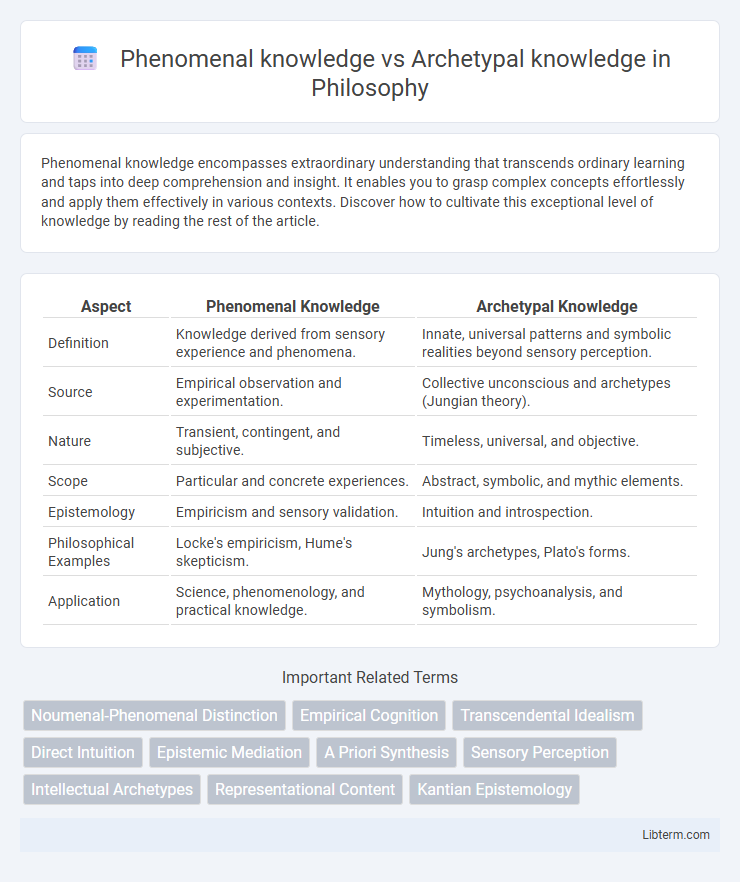Phenomenal knowledge encompasses extraordinary understanding that transcends ordinary learning and taps into deep comprehension and insight. It enables you to grasp complex concepts effortlessly and apply them effectively in various contexts. Discover how to cultivate this exceptional level of knowledge by reading the rest of the article.
Table of Comparison
| Aspect | Phenomenal Knowledge | Archetypal Knowledge |
|---|---|---|
| Definition | Knowledge derived from sensory experience and phenomena. | Innate, universal patterns and symbolic realities beyond sensory perception. |
| Source | Empirical observation and experimentation. | Collective unconscious and archetypes (Jungian theory). |
| Nature | Transient, contingent, and subjective. | Timeless, universal, and objective. |
| Scope | Particular and concrete experiences. | Abstract, symbolic, and mythic elements. |
| Epistemology | Empiricism and sensory validation. | Intuition and introspection. |
| Philosophical Examples | Locke's empiricism, Hume's skepticism. | Jung's archetypes, Plato's forms. |
| Application | Science, phenomenology, and practical knowledge. | Mythology, psychoanalysis, and symbolism. |
Introduction to Phenomenal and Archetypal Knowledge
Phenomenal knowledge refers to experiential understanding gained through direct sensory perception and conscious awareness of events, emphasizing subjective experience. Archetypal knowledge involves universal, symbolic patterns embedded in the collective unconscious, representing innate ideas and motifs shared across cultures. Both types of knowledge form complementary frameworks for interpreting reality, with phenomenal knowledge highlighting individual perception and archetypal knowledge revealing fundamental structures of meaning.
Defining Phenomenal Knowledge
Phenomenal knowledge refers to the direct, subjective experience of phenomena, encompassing sensory perceptions and conscious awareness. It contrasts with archetypal knowledge, which involves abstract, universal patterns or symbolic representations independent of immediate experience. Defining phenomenal knowledge emphasizes its grounding in personal, first-person perspectives and the qualitative aspects of experience.
Exploring Archetypal Knowledge
Exploring Archetypal knowledge reveals a deep understanding rooted in universal symbols, myths, and collective unconscious patterns that transcend individual experiences. This type of knowledge taps into inherited cognitive structures identified by Carl Jung, promoting a holistic grasp of human behavior and cultural narratives. Archetypal knowledge enriches interpretation across disciplines such as psychology, literature, and anthropology by providing a framework for recognizing recurring motifs and fundamental truths.
Historical Perspectives on Knowledge Types
Phenomenal knowledge, grounded in sensory experience and empirical observation, contrasts with archetypal knowledge, which relies on innate ideas and universal patterns recognized across cultures. Historical perspectives from ancient Greek philosophy, such as Plato's theory of forms, emphasize archetypal knowledge as transcendent truths, while empiricism in the Enlightenment period highlights phenomenal knowledge through scientific methods. The evolution of epistemology reveals ongoing debates about the validity and sources of knowledge, shaping contemporary understanding of how humans acquire and validate different types of knowledge.
Key Differences Between Phenomenal and Archetypal Knowledge
Phenomenal knowledge is derived from direct sensory experience and observable phenomena, emphasizing empirical evidence and data-driven insights. Archetypal knowledge, on the other hand, originates from universal symbols, myths, and collective unconscious patterns that inform cultural and psychological understanding. The key difference lies in phenomenal knowledge's basis in tangible reality, whereas archetypal knowledge is rooted in abstract, symbolic frameworks shaping human cognition and behavior.
Roles of Perception and Intuition
Phenomenal knowledge relies heavily on perception, emphasizing sensory experience and empirical observation as primary sources of understanding phenomena. Archetypal knowledge, however, is rooted in intuition, drawing on innate patterns and universal symbols to grasp deeper meanings beyond immediate sensory input. The interplay between perception and intuition allows for a comprehensive epistemological approach where empirical data and intrinsic insight coexist to enhance human cognition.
Philosophical Theories and Thought Leaders
Phenomenal knowledge, rooted in empirical experience and sensory perception, is extensively discussed in the philosophy of Immanuel Kant, who distinguished it from noumenal knowledge--the realm beyond sensory experience. Archetypal knowledge, prominently explored by Carl Jung, involves innate, universal symbols and patterns embedded in the collective unconscious, influencing human cognition and behavior. Philosophical theories integrating these concepts often examine the interface between subjective experience and universal truths, bridging phenomenology and analytical psychology to understand knowledge formation.
Implications in Cognitive Science and Psychology
Phenomenal knowledge, referring to subjective conscious experiences, and archetypal knowledge, involving universal symbolic patterns, both play critical roles in cognitive science and psychology by shaping understanding of mental processes and behaviors. Phenomenal knowledge provides insights into the qualitative aspects of consciousness and subjective perception, essential for studying awareness, emotions, and phenomenology. Archetypal knowledge influences cognitive frameworks and collective unconscious theories, offering a basis for interpreting symbolic behaviors, cultural myths, and shared psychological constructs.
Applications in Modern Epistemology
Phenomenal knowledge encompasses direct experiential understanding rooted in sensory perception, while archetypal knowledge involves abstract, universal patterns derived from collective human consciousness. Modern epistemology applies phenomenal knowledge to enhance empirical methodologies, emphasizing firsthand experiential data for validating truth claims. Archetypal knowledge informs theoretical frameworks by providing symbolic structures and foundational concepts that guide interpretation across diverse disciplines such as cognitive science and hermeneutics.
Conclusion: Bridging Phenomenal and Archetypal Knowledge
Bridging phenomenal knowledge, which is grounded in direct sensory experience, with archetypal knowledge, rooted in universal symbols and collective unconscious, creates a comprehensive framework for understanding reality. Integrating empirical data with deep, symbolic insights enhances cognitive flexibility and enriches interpretation across disciplines. This synthesis fosters holistic wisdom, enabling more nuanced decision-making and deeper meaning-making processes.
Phenomenal knowledge Infographic

 libterm.com
libterm.com